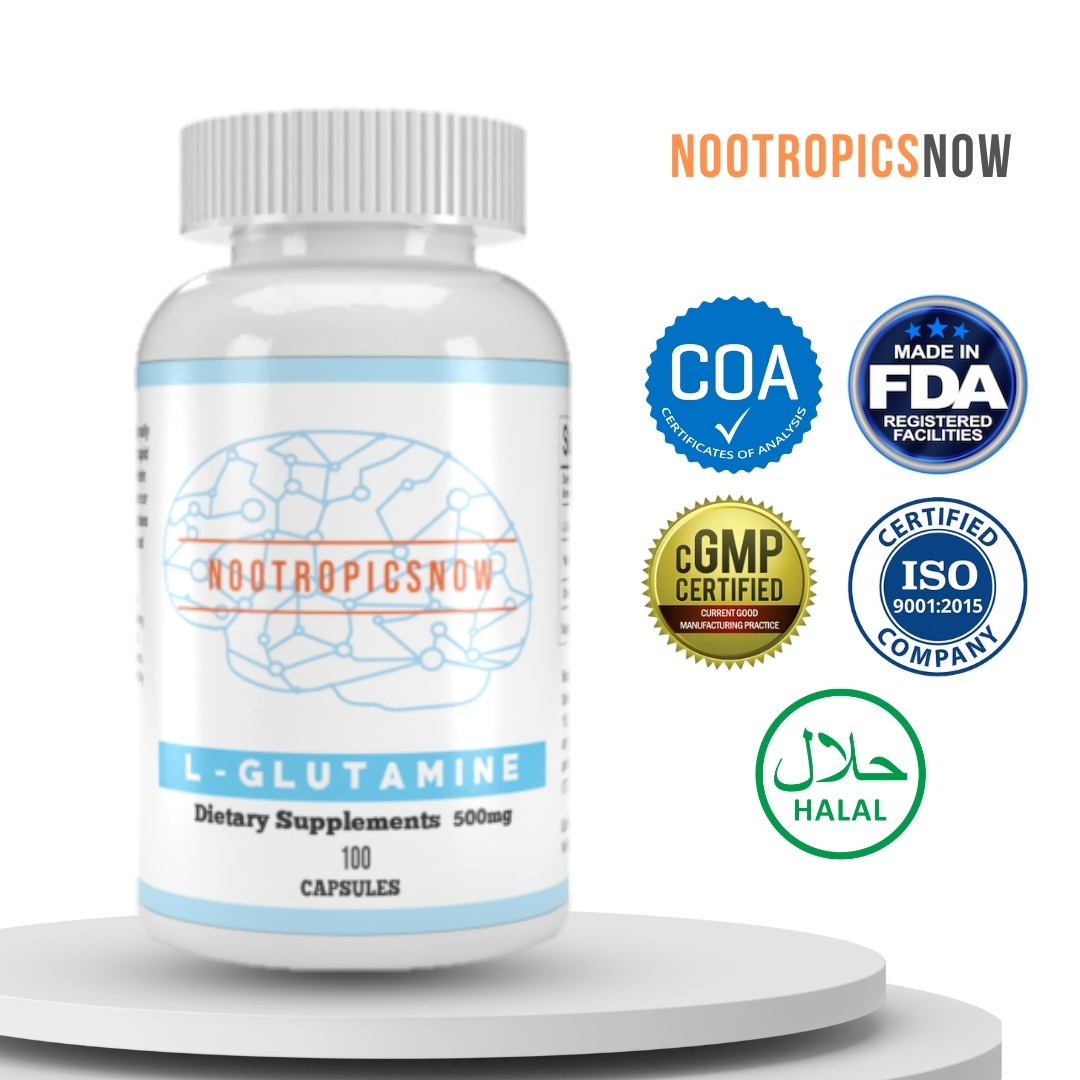L-Glutamine: Benefits, Uses & Side Effects

L-Glutamine: Unlocking its Benefits for Gut Health, Muscle Recovery, and Immunity

L-glutamine, often simply referred to as glutamine, stands as the most abundant free amino acid found circulating in human blood. As a conditionally essential amino acid, it plays a vital role in numerous physiological processes, ranging from supporting gut health and muscle growth to bolstering immune function and facilitating optimal metabolic activity. Understanding L-glutamine’s significance and potential benefits can empower individuals to make informed decisions about their health and wellness.
Understanding L-Glutamine: The Basics
Delving into the Chemical Composition and Primary Functions
L-Glutamine, chemically represented as C5H10N2O3, is a building block of protein. The body can typically produce enough glutamine to meet its needs. However, under specific circumstances like intense exercise, illness, injury, or chronic stress, the demand for glutamine increases, making it conditionally essential. This means that during these times, dietary intake or supplementation becomes necessary to maintain optimal levels. Moreover, glutamine participates in nitrogen transport, acid-base regulation, and gluconeogenesis (the production of glucose from non-carbohydrate sources).
Dietary Sources: Where to Find Glutamine Naturally
Fortunately, L-glutamine is readily available through various dietary sources, primarily protein-rich foods. Excellent sources include:
L-Glutamine Supplementation: Dosage and Forms
When dietary intake alone isn’t sufficient, L-glutamine supplements provide a convenient way to increase glutamine levels. These supplements typically come in several forms, including powders, capsules, and tablets. The dosage can vary significantly depending on individual needs and health conditions. A typical dose ranges from 500 mg to 5 grams per day, yet higher dosages, up to 30 grams daily, are sometimes used under medical supervision for specific therapeutic purposes.
Athletes and individuals engaged in intensive training frequently use glutamine supplements to expedite muscle recovery and reduce muscle soreness. Furthermore, people with gastrointestinal issues or compromised immune systems may also benefit from supplementation. It’s always wise to consult a healthcare professional to determine the appropriate dosage and usage for your specific circumstances.
L-Glutamine for Gut Health: Repairing the Intestinal Barrier
L-glutamine stands out as a crucial player in maintaining and repairing the intestinal barrier. This barrier, a single layer of epithelial cells lining the intestines, serves as the body’s primary defense against harmful substances. Therefore, compromised gut health can lead to a cascade of health issues, from nutrient malabsorption to systemic inflammation.
How L-Glutamine Supports Gut Integrity
L-glutamine acts as a primary energy source for the cells lining the intestinal wall, called enterocytes. This fuel allows these cells to function optimally, maintaining tight junctions that prevent the leakage of undigested food particles, bacteria, and toxins into the bloodstream.
Leaky Gut Syndrome and L-Glutamine
Leaky gut syndrome, also known as increased intestinal permeability, occurs when the tight junctions between enterocytes become compromised, allowing substances to leak through the intestinal wall. This leakage can trigger an immune response, leading to systemic inflammation and various health problems, including autoimmune diseases, food sensitivities, and digestive disorders.

View Product
L-glutamine supplementation has shown promise in addressing leaky gut syndrome by:
L-Glutamine and Inflammatory Bowel Disease (IBD)
Inflammatory bowel disease (IBD), which includes Crohn’s disease and ulcerative colitis, is characterized by chronic inflammation of the digestive tract. L-glutamine has shown potential as a therapeutic agent in managing IBD by:
Dosage and Considerations for Gut Health
The appropriate dosage of L-glutamine for gut health varies depending on the individual and the severity of their condition. However, a common starting dose is typically around 5-10 grams per day, divided into two or three doses. It is best to start with a lower dose and gradually increase as needed, monitoring for any potential side effects. Consulting a healthcare professional is recommended, especially for individuals with pre-existing medical conditions or those taking medications.
View Product-Nootropic-Brain-Booster-Amino-Acid-Energy-Exercise-i.202321183.23955994962)
Integrating L-Glutamine into a Gut-Healthy Lifestyle
While L-glutamine supplementation can be beneficial for gut health, it is essential to adopt a comprehensive gut-healthy lifestyle that includes:
L-Glutamine for Muscle Growth and Recovery: The Athlete’s Ally
L-glutamine plays a critical role in muscle growth and recovery, particularly for athletes and individuals engaging in intense physical activity. During strenuous exercise, L-glutamine levels in the body can become depleted, leading to muscle fatigue, reduced performance, and increased risk of injury. Supplementing with L-glutamine can help replenish these depleted levels, promoting muscle growth, reducing muscle soreness, and accelerating recovery.
How L-Glutamine Supports Muscle Growth
L-glutamine contributes to muscle growth through several mechanisms:
L-Glutamine for Muscle Recovery
L-glutamine aids in muscle recovery by:
Dosage and Timing for Muscle Growth and Recovery
The optimal dosage and timing of L-glutamine supplementation for muscle growth and recovery depend on various factors, including exercise intensity, training volume, and individual needs. However, a common recommendation is to take 5-10 grams of L-glutamine immediately after exercise and another 5-10 grams before bed.
Synergistic Effects with Other Supplements
L-glutamine can be combined with other supplements to enhance its muscle-building and recovery benefits. Some popular combinations include:
L-Glutamine Beyond Muscle: Benefits for Endurance Athletes
L-glutamine is not only beneficial for strength and power athletes but also for endurance athletes. Endurance activities, such as long-distance running and cycling, can significantly deplete L-glutamine levels, leading to immune suppression and increased susceptibility to illness.
L-glutamine supplementation can help endurance athletes maintain their immune function and reduce their risk of illness, allowing them to train consistently and perform at their best. In addition to immune support, L-glutamine can also improve glycogen replenishment, which is crucial for maintaining energy levels during prolonged endurance events.
L-Glutamine and Immune Function: Fortifying Your Defenses
L-glutamine plays a vital role in supporting the immune system, serving as a primary fuel source for immune cells, including lymphocytes (white blood cells) and macrophages. These cells are critical for fighting off infections, combating diseases, and maintaining overall immune health.
How L-Glutamine Fuels Immune Cells
L-Glutamine and Immune Function in Stressful Situations
During times of stress, such as illness, injury, or intense exercise, L-glutamine demand increases significantly. When L-glutamine levels become depleted, immune function can be compromised, making the body more susceptible to infections.
L-Glutamine and the Gut-Immune Connection
The gut is a major site of immune activity, housing a significant portion of the body’s immune cells. L-glutamine’s role in maintaining gut health also contributes to immune function. A healthy gut barrier prevents the leakage of bacteria and toxins into the bloodstream, reducing the burden on the immune system.
By supporting gut health, L-glutamine indirectly enhances immune function, helping to maintain a balanced and responsive immune system.
Dosage and Considerations for Immune Support
The recommended dosage of L-glutamine for immune support varies depending on the individual’s health status and the level of stress they are experiencing. However, a common recommendation is to take 5-10 grams per day, divided into two or three doses.
L-Glutamine as a Complementary Therapy
While L-glutamine can be a valuable tool for supporting immune function, it is essential to view it as a complementary therapy rather than a replacement for conventional medical treatment. Maintaining a healthy lifestyle, including a balanced diet, regular exercise, and adequate sleep, is crucial for optimizing immune health.
L-Glutamine Beyond the Basics: Other Potential Benefits
While L-glutamine’s primary roles in gut health, muscle growth, and immune function are well-established, research suggests that it may offer other potential health benefits, including:
Brain Health
L-glutamine is a precursor to glutamate, a neurotransmitter that plays a vital role in brain function. While the brain can synthesize glutamate from glutamine, disruptions in the glutamine-glutamate cycle have been implicated in various neurological disorders, including epilepsy, schizophrenia, and bipolar disorder.
While more research is needed, some studies suggest that L-glutamine supplementation may improve cognitive function and reduce symptoms in individuals with certain neurological conditions.
Weight Loss
Some research suggests that L-glutamine may promote weight loss by altering the composition of the gut microbiome and improving insulin sensitivity. However, these findings are preliminary, and more studies are needed to confirm L-glutamine’s role in weight management.
Sickle Cell Disease
L-glutamine has been shown to reduce red blood cell damage in individuals with sickle cell disease, helping to maintain normal blood flow and reduce complications associated with the condition. L-glutamine is actually approved by the FDA to reduce complications of Sickle Cell Disease in patients older than 5 years of age.
Burns and Wound Healing
Some research suggests that L-glutamine may help speed the healing of burns and reduce related infections. It can stimulate the production of collagen, essential for repairing damaged tissues. However, more studies are required to confirm its role in burn care and wound healing.
Safety and Side Effects of L-Glutamine
L-glutamine is generally considered safe for short-term use in healthy individuals. However, some individuals may experience side effects, including:
Precautions
Choosing a High-Quality L-Glutamine Supplement
When selecting an L-glutamine supplement, consider the following factors:
View Product-Nootropic-Brain-Booster-Amino-Acid-Energy-Exercise-i.202321183.23955994962)
Conclusion: L-Glutamine as a Versatile Nutrient
L-glutamine is a versatile amino acid with a wide range of potential health benefits. From supporting gut health and immune function to promoting muscle growth and recovery, L-glutamine plays a crucial role in maintaining overall health and well-being. While more research is needed to fully understand its long-term effects and potential applications, L-glutamine shows promise as a valuable nutrient for supporting various aspects of health. As always, it is best to consult with a healthcare professional before adding any new supplements to your routine.

